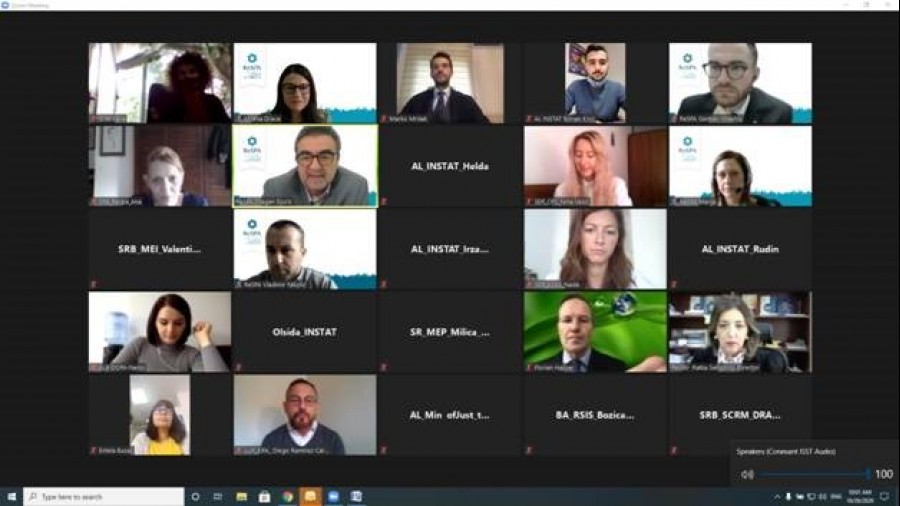
Seasonal School on EU Accession Negotiation
A unique opportunity for Western Balkans teams dealing with EU accession negotiations to connect, network, and discuss current and future challenges related to accession negotiations
26-30 October, Online
ReSPA is organizing a five-day online School in cooperation with the European Institute of Public Administration (EIPA). It aims to empower the civil servants in the WB public administrations with knowledge and professional skills but also to provide them with the opportunity to convene, talk to and learn from each other.
Around 100 participants from the Western Balkans countries have gathered in this regard, especially to share lesson learned from Montenegro and Serbia who already developed meaningful experiences in negotiations with colleagues from Albania, Bosnia and Hercegovina and North Macedonia.
The importance of this year’s School is more evident with the fact that it is happening after the European Commission introduced its proposal for a new Enlargement Methodology, which will reinvigorate the accession process by making it more predictable, credible, and dynamic.
The Methodology will be applied to North Macedonia and Albania’s accession process and will be optional for Montenegro and Serbia. In July 2020, the European Commission presented the Council draft Negotiating Frameworks for Albania and North Macedonia, laying out the guidelines and principles for their accession talks. This year’s School also focuses on the content of the negotiation process for the following Chapters of the acquis: 18, 22, 23, 24 and 27.
At its opening, Ms Ratka Sekulović, ReSPA Director, addressed the participants expressing her satisfaction by the fact that the School raised such a high interest in the Western Balkans region.
Mr Florian Houser, European Commission, DG NEAR shared his personal experience while he was working on opening Chapter 22 in Bulgaria and Croatia and also gave handy tips to participants on how to deal with the negotiation process focusing on real needs of citizens and businesses in the Western Balkans.
Mr Marko Mrdak, Deputy Chief Negotiator for the Chapter on the Acquis Communautaire, emphasized the importance of the strong collaboration between the Western Balkans during the negotiation process.
On the first day of the School, Juan Diego Ramírez-Cárdenas, ReSPA Expert (EIPA) gave a general overview of legal and political dimensions to the EU Accession Policy while Wolfgang Koeth, ReSPA Expert (EIPA) exposed practical aspects of Accession Negotiations focusing on actors, tools and instruments in the accession process.
On the second day, Gordana Đurović, ReSPA Expert presented models of institutional coordination of the European integration process in the Region focusing on the lesson learned and providing meaningfull recommandations for improving the coordination mechanisms within the Countries. While Bojan Vujović, Expert form Montenegro and Nevena Marčeta, Expert from Serbia presented the practical examples from Montenegro and Serbia on Chapter 22 related to the coordination of regional policies and structural instruments (EU funds and Programmes).
On the third day, Wolfgang Koeth, ReSPA Expert (EIPA) presented Accession negotiation through a step-by-step screening process and technical negotiations chapter by chapter. Svetlana Rajković, Expert form Montenegro and Miloš Samardžić, Expert from Serbia exposed the content of negotiation focusing on practical experiences from Montenegro and Serbia on Chapters 23 and 24, emphasizing that these chapters have a substantial importance during the negotiations.
The first three days of the School have been characterized by lively discussions by participants on many isues such as the political and technical dimension of the negotiations, the Copenhagen criteria, the future of the process, etc.
“This year Seasonal School on EU accession negotiations comes at a very crucial moment for the region: on one hand, there is a new methodology in place for conducting the accession negotiations and on the other hand, Albania and North Macedonia are on the verge of starting the process. Generally speaking, the Seasonal School builds on these two pillars: firstly, by explaining the new negotiations methodology, how the chapters will be divided into six clusters and how will the negotiations be conducted; and secondly, by providing clear tips and recommandations on the negotiation process on specific Chapters of the acquis. In doing so, we are relying on the experts of the European Institute of Public Administration (EIPA) and on the knowledge of civil servants from Montenegro and Serbia who already developed meaningful experiences in negotiations. We believe that initiatives like the ReSPA’s Seasonal School contribute to improving the capacities of civil servants across the Region and, indirectly, contribute to the dynamics of reforms in the Region.” higlighthed Gentian Xhaxhiu, Programme Manager Legal, ReSPA.



